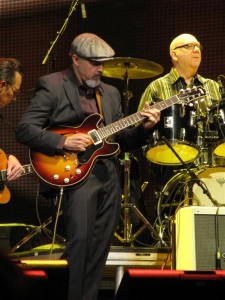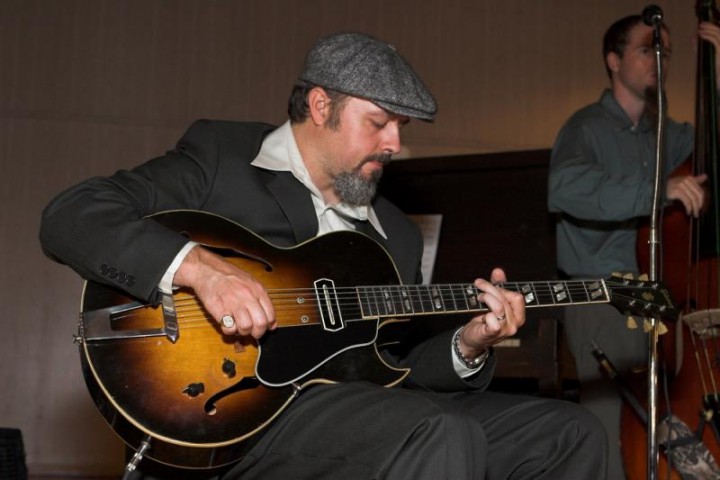By: Jamie Holroyd
 Thankfully, the Internet and YouTube have made discovering new musicians all over the world easier than ever. Several fantastic guitar players in countries I’ve never been to have made their way onto my computer screen. One of these is the Texas-based Dave Biller.
Thankfully, the Internet and YouTube have made discovering new musicians all over the world easier than ever. Several fantastic guitar players in countries I’ve never been to have made their way onto my computer screen. One of these is the Texas-based Dave Biller.
Biller has toured and recorded with Wayne Hancock, Dale Watson, and Deke Dickerson and is mostly known as a professional pedal steel player, but his record, Hot Guitars of Biller & Wakefield, captured the ears of guitar and music lovers everywhere.
Like many guitarists of his age, Biller’s first hero’s were classic rock guitarists such as Jimmy Page, Clapton, and Hendrix, but jazz “became his religion” after discovering a ‘Best of Coltrane’ cassette in a clearance bin in an old record store.
Biller has a unique guitar style that takes influence from jazz heavyweights such as Barney Kessel and Howard Roberts, country pickers such as Roy Nichols and James Burton and the three Blues Kings; Freddie, Albert, and BB, but he says the guitarist which made the biggest impact on his playing was Django Reinhardt.
“In 1998 I saw the film footage of him for the first time and it changed my life in music forever. It was a pivotal moment and for the next 5 years I was hopelessly lost in the world of gypsy jazz.”
Although Biller was once an exclusive Tele picker, he now plays anything from Strats, Les Pauls, 175 C’s, and was recently seen performing at the Crossroads festival with a Collings 335 where he got to play with one of his musical heroes, Jimmie Vaughan.
“Well, my big moment at Eric Clapton’s Crossroads Festival was pretty memorable for obvious reasons. But also because there was a bit of a musical meltdown onstage, whereupon the beat got turned around, making the whole tune sound like some kind of psychedelic free jazz excursion! Oh well, maybe I wasn’t meant to be a stadium rock star. It was an incredible experience, nonetheless.”
A popular YouTube video shows Biller with a Tele equipped with a Charlie Christian pickup which he comments “I had a Lollar CC in one of my Teles and really liked it, plus it looked really cool, but the best sounding neck pickup I ever had in a telecaster was a Gibson mini humbucker. Phenomenal! I moved the same pickup to another Tele later and it sounded like crap! Oh well!”

The only ‘telecaster’ Biller owns at the minute is a thinline fitted with Jazzmaster pickups, quite far from your standard blackguard model. Out all the guitars he has owned over the years, he says that some of his favourites he wish he still had are a fiesta red ’66 Tele, (“the best sounding Tele I owned”), his first Strat (’74), and a ’71 Black Beauty Custom which he loved despite it being an immensely heavy guitar.
A couple of years ago Biller developed focal dystonia in his right hand which can still make his musical endeavours challenging, but inspired by Django’s more serious injury, he spends much of his practice time dealing with the set back but was a very serious student of the guitar in his younger days.
“Well, I hate to admit this, but I really don’t practice the guitar anymore. When I did, I was very organized and militant about it. I went through the typical 10 hour day phase when I was younger and really tried to schedule my routine. Nowadays if I do sit down with a guitar, I mainly just noodle!”
Biller’s practice routine would start with scale and arpeggio warm-ups then move on to chord studies, sight reading, repertoire, and transcription. “I started out learning complete solos and meticulously writing them out. Sometimes I found myself labouring over the physical transcription itself and spent too much time on the paper instead of learning to play it!”
“I did some transcriptions with no instrument in my hand but then would have a real hard time learning them, so I started doing shorter phrases. If I heard a passage that I really liked I would write it in a book I had compiled. I analyzed each one to get the essence of why it sounded good to me and use the info to try and develop my own ideas. When I was learning Django’s stuff I memorized everything and never wrote down a single note and never have since.”

The focused approach to practice was reflected in his advice to young guitar players in which he says “As cliché as it sounds, practice and learn everything you can about music. There seems to be this sort of anti-theory mentality, as if knowledge is bad and will make your playing sound clinical or sterile. Horse feathers! I say! It’s all about taste and how you apply your knowledge.”
This positive approach to practicing and playing the guitar is still apparent. When asked what his goals are for the future he replied “My only goals are to continue improving my craft.”
Jamie Holroyd is a UK based jazz educator and author who runs Jamie Holroyd Guitar, a free website filled with lessons for the studying jazz guitarist.